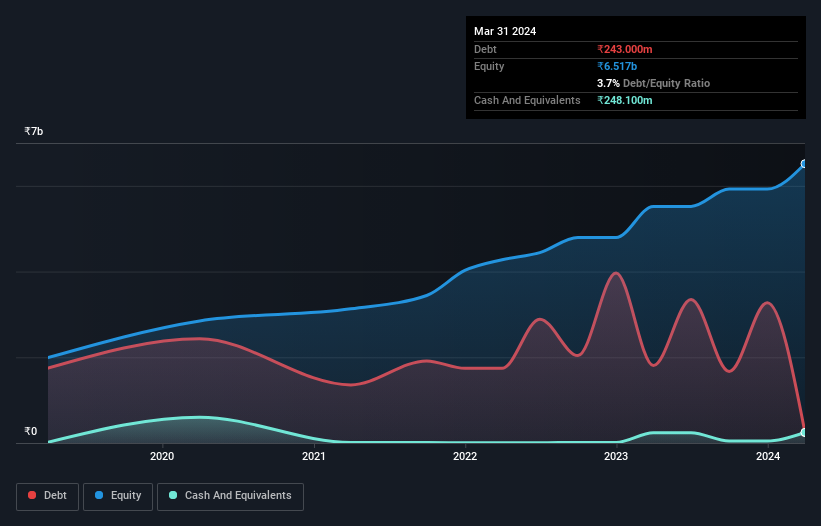Howard Marks put it nicely when he said that, rather than worrying about share price volatility, 'The possibility of permanent loss is the risk I worry about... and every practical investor I know worries about.' So it might be obvious that you need to consider debt, when you think about how risky any given stock is, because too much debt can sink a company. We can see that Campus Activewear Limited (NSE:CAMPUS) does use debt in its business. But the more important question is: how much risk is that debt creating?
What Risk Does Debt Bring?
Debt and other liabilities become risky for a business when it cannot easily fulfill those obligations, either with free cash flow or by raising capital at an attractive price. Ultimately, if the company can't fulfill its legal obligations to repay debt, shareholders could walk away with nothing. However, a more common (but still painful) scenario is that it has to raise new equity capital at a low price, thus permanently diluting shareholders. Having said that, the most common situation is where a company manages its debt reasonably well - and to its own advantage. The first step when considering a company's debt levels is to consider its cash and debt together.
Check out our latest analysis for Campus Activewear
What Is Campus Activewear's Net Debt?
The image below, which you can click on for greater detail, shows that Campus Activewear had debt of ₹243.0m at the end of March 2024, a reduction from ₹1.81b over a year. However, its balance sheet shows it holds ₹248.1m in cash, so it actually has ₹5.10m net cash.

A Look At Campus Activewear's Liabilities
The latest balance sheet data shows that Campus Activewear had liabilities of ₹2.76b due within a year, and liabilities of ₹1.69b falling due after that. Offsetting these obligations, it had cash of ₹248.1m as well as receivables valued at ₹1.50b due within 12 months. So its liabilities outweigh the sum of its cash and (near-term) receivables by ₹2.70b.
Given Campus Activewear has a market capitalization of ₹91.6b, it's hard to believe these liabilities pose much threat. However, we do think it is worth keeping an eye on its balance sheet strength, as it may change over time. Despite its noteworthy liabilities, Campus Activewear boasts net cash, so it's fair to say it does not have a heavy debt load!
Importantly, Campus Activewear's EBIT fell a jaw-dropping 24% in the last twelve months. If that decline continues then paying off debt will be harder than selling foie gras at a vegan convention. When analysing debt levels, the balance sheet is the obvious place to start. But it is future earnings, more than anything, that will determine Campus Activewear's ability to maintain a healthy balance sheet going forward. So if you're focused on the future you can check out this free report showing analyst profit forecasts.
Finally, a business needs free cash flow to pay off debt; accounting profits just don't cut it. Campus Activewear may have net cash on the balance sheet, but it is still interesting to look at how well the business converts its earnings before interest and tax (EBIT) to free cash flow, because that will influence both its need for, and its capacity to manage debt. During the last three years, Campus Activewear produced sturdy free cash flow equating to 50% of its EBIT, about what we'd expect. This cold hard cash means it can reduce its debt when it wants to.
Summing Up
While it is always sensible to look at a company's total liabilities, it is very reassuring that Campus Activewear has ₹5.10m in net cash. So we are not troubled with Campus Activewear's debt use. Of course, we wouldn't say no to the extra confidence that we'd gain if we knew that Campus Activewear insiders have been buying shares: if you're on the same wavelength, you can find out if insiders are buying by clicking this link.
If, after all that, you're more interested in a fast growing company with a rock-solid balance sheet, then check out our list of net cash growth stocks without delay.
New: AI Stock Screener & Alerts
Our new AI Stock Screener scans the market every day to uncover opportunities.
• Dividend Powerhouses (3%+ Yield)
• Undervalued Small Caps with Insider Buying
• High growth Tech and AI Companies
Or build your own from over 50 metrics.
Have feedback on this article? Concerned about the content? Get in touch with us directly. Alternatively, email editorial-team (at) simplywallst.com.
This article by Simply Wall St is general in nature. We provide commentary based on historical data and analyst forecasts only using an unbiased methodology and our articles are not intended to be financial advice. It does not constitute a recommendation to buy or sell any stock, and does not take account of your objectives, or your financial situation. We aim to bring you long-term focused analysis driven by fundamental data. Note that our analysis may not factor in the latest price-sensitive company announcements or qualitative material. Simply Wall St has no position in any stocks mentioned.
Have feedback on this article? Concerned about the content? Get in touch with us directly. Alternatively, email editorial-team@simplywallst.com
About NSEI:CAMPUS
Campus Activewear
Engages in the design, manufacture, marketing, and distribution of sports and athleisure footwear, apparels, and backpacks for men, women, and children in India and internationally.
Flawless balance sheet with solid track record.
Similar Companies
Market Insights
Community Narratives



